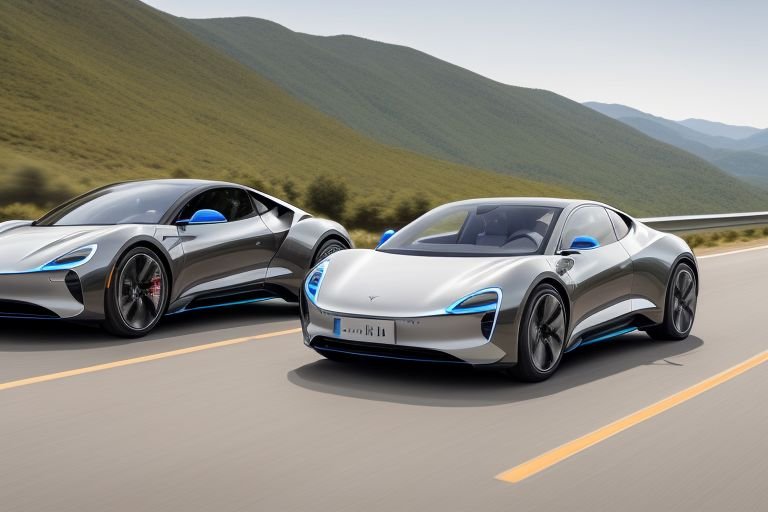
Luxury Automakers Embrace Electric Future With New EV Models
In a notable transformation occurring in the automotive market luxury car producers are prioritizing electric vehicles. Prestige manufacturers famous for their dynamic engines and lavish styling are hustling to include electric automobiles within their ranges.
Countries everywhere tighten their emissions rules as buyers grow eager for sustainable vehicle choices. Performing luxury brands now face the challenge of preserving their reputation as they embrace electric vehicles.
As a pioneer in electric vehicles Porsche is leading the way with its groundbreaking Taycan. Alike in praise from critics and consumers the Taycan stands as a stylish electric car proving that luxury brands can deliver exceptional driving experiences. Porsche is launching efforts to broaden its electric range by creating electric Macan and 718 variants.
The EQ sub-brand has been introduced by Mercedes-Benz for electric vehicles only. As the top model of its new collection is the EQS,a luxury sedan made exclusively for electric propulsion. Featuring impressive range and a cutting-edge appearance; the EQS strives to create a new level for electric luxury vehicles. By 2025 Mercedes-Benz will provide electric options for each model in its range to demonstrate its commitment to a future with electric vehicles.
Another German luxury carmaker BMW is continuously broadening its electric portfolio through the ‘i’ line. The BMW i4 serves as a showcase of the company’s attempt to enter the luxury electric vehicle category. The driving experience popular with BMW enthusiasts merges with electric power to engage customers who value sustainability.
Audi positioned under the Volkswagen Group has notably improved its electric vehicle offerings. The e-tron SUV and e-tron GT sports sedan are now available for sale and additional electric models will appear soon. Audi’s strategy combines high-tech features with its own distinctive style to make its electric cars clearly Audi.
Some top luxury brands are Getting involved in the movement towards electric power. By 2030 Bentley will transition completely to electric vehicles because of its quality craftsmanship and powerful W12 engines. The company is aiming for 2025 when it will introduce its initial all-electric model that will distinctly distinguish itself from its prior designs. In unveiling the Spectre as its first electric vehicle Rolls-Royce embodies the highest level of luxury in automobiles. This action shows that even the most premium car brands are adopting electrification.
Jaguar Land Rover has pledged to adopt an electric future. Land Rover intends to launch six electric models in the next five years. The company’s aggressive tactics show its faith in electric vehicles as essential for lasting prosperity in the luxury market.
The switch to electric vehicles offers luxury automakers various challenges and chances. The expectation of luxury car buyers regarding performance and driving traits creates a major challenge for automakers. Electric systems deliver quick torque and steady acceleration; however. creating the atmosphere of a high-performance gasoline vehicle calls for inventive engineering ideas.
Potential buyers of electric cars often express fear about range anxiety. To solve this issue luxury car brands are producing batteries offering greater range and committing resources to quick charging solutions. Numerous companies are working with charging network vendors to provide easy access to charging facilities for their clients.
By concentrating on interior design and technology integration luxury brands may distinguish themselves in the electric vehicle sector. Since there is no requirement for a large engine compartment designers are able to generate bigger and more imaginative interior spaces. The features of advanced systems and connectivity along with autonomous driving are turning into vital marketing advantages for luxury electric vehicles.
With the move to electric vehicles coming soon luxury carmakers have begun to reassess their production frameworks and logistics. Various firms are putting resources into the development of unique electric vehicle systems and battery-making assets to accommodate the rising appeal for electric luxury cars.
Luxury automakers experience a major shift with the adoption of electric vehicles while also generating possibilities for invention and advancement. With electric powertrain technology new vehicle architecture and performance limits can emerge that were previously out of reach. from traditional gasoline engines. Similarly,the shift to electric options coordinates luxury brands with evolving consumer demands and legal demands for their future growth.
This adjustment influences sectors further than the automotive field. By shifting to electric powertrains luxury brands alter society’s view on electric cars. The status of these brands contributes to making electric cars appealing and vision-oriented items to speed up wider uptake of electric vehicles in different segments.
With the ongoing launch of electric models by luxury automakers the competition in the premium electric car market intensifies. Such competition generates fast developments in aesthetics and technology that supports consumers and accelerates the industry.
The adoption of electric vehicles by the luxury car segment signifies a critical moment in the history of automobiles. When these high-end brands pour resources into EVs they not only protect their futures but also impact the wider movement to renewable transportation. In the years ahead is expected a rise in high-performance electric luxury vehicles that will alter the industry landscape.


